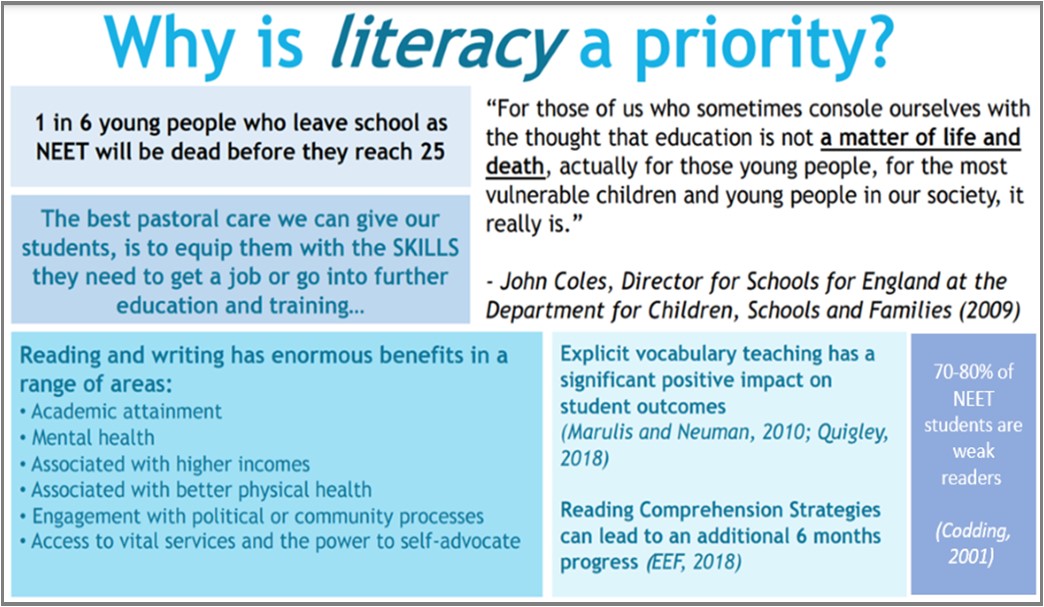
The reading strategy is a graduated response, designed to
develop the ability of all students in their reading, and to pinpoint and
overcome individual barriers to reading development buy focusing on; Reading
Accuracy (phonic knowledge) Fluency (automaticity and prosody skills) Comprehension
(understanding of increasingly complex vocabulary and texts) and Disciplinary
Reading (Reading in the best disciplinary manner for the subject being
studied).
By graduating through these four areas we support growth in
reading comprehension across all subjects and ensure all students become
independent readers, learning to read across disciplines and learning across
disciplines through reading.
The graduated strategy has four main stages:
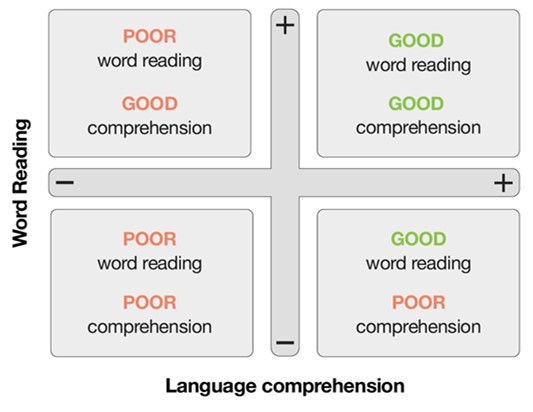
Reading fluency is now more commonly agreed to be made up of
the following components:
Comprehension builds on this as students widen their
vocabulary and develop the ability to tackle more complex and academic texts.
A good starting point for understanding reading development
is the Simple View of Reading (Fig 1.) It highlights that successful reading is
a product of two complex, but separable processes:
The simple view of reading emphasises how word reading and comprehension should be taken into account when assessing reading, when identifying pupils who need support, for targeting interventions and for monitoring progress.
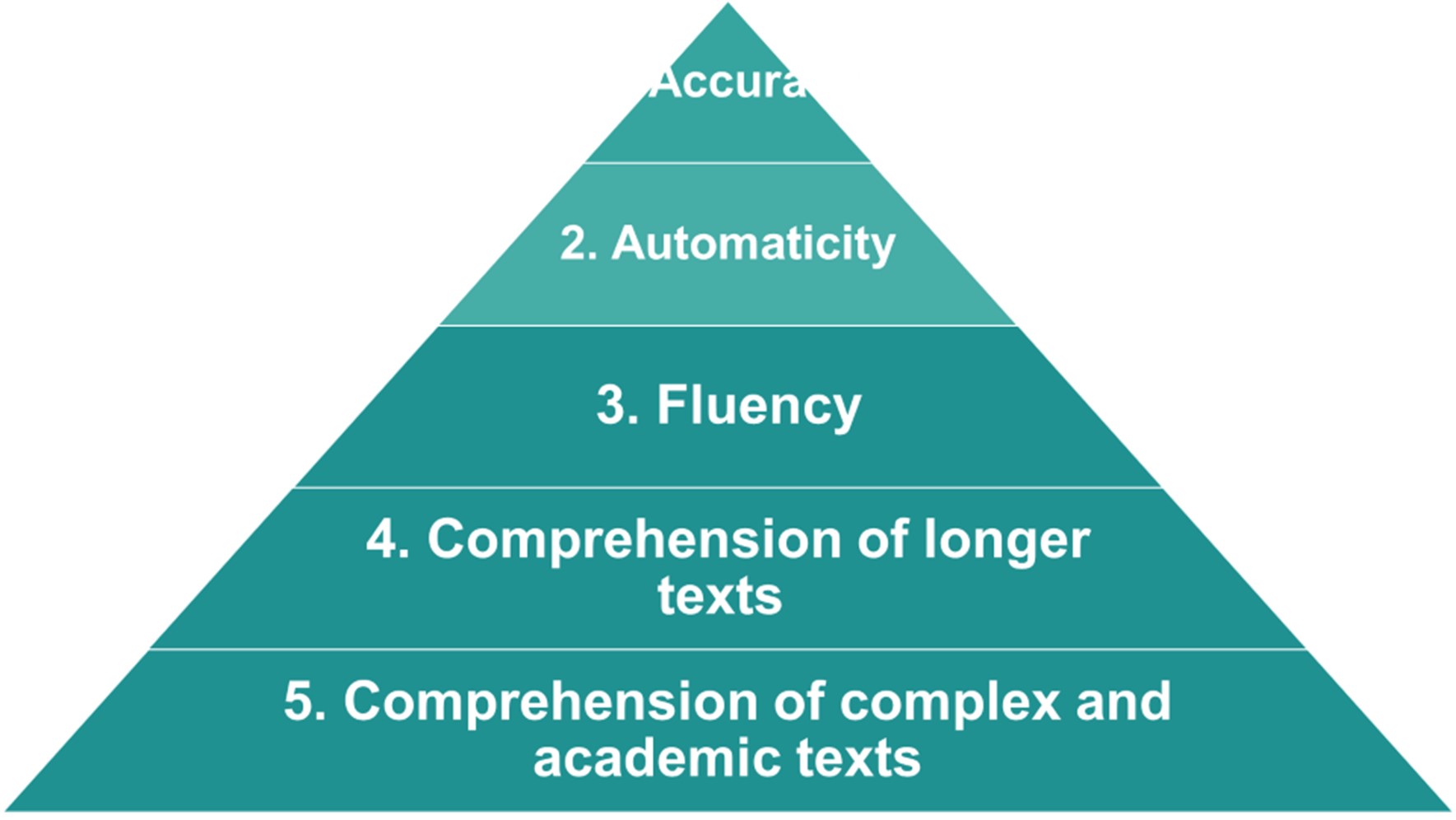
The COVID-19 pandemic meant that students missed time in primary schools learning the basic components of reading. Nationally, this loss equated to approximately 1.5 months for the 2021-year 6 cohort, and 1.2 months for the 2022-year 6 cohort. For disadvantaged students this gap was much wider (DfE 2021).
We have mapped students with very low reading abilities against other areas of disadvantage and vulnerability to ensure we can put in place a holistic package to support.

All students in years 7 – 9 are tested at the start of each academic year, with termly testing for KS3 students and those students in year 10 identified as needing additional support. Reading age testing covers word recognition, vocabulary knowledge and whole text comprehension. Students are also tested using vocabulary screening and for reading fluency within their English lessons. Those students identified as potentially lacking phonic knowledge are also screened using Read Write inc. Student reading proficiency is grouped in 5 stages (please see pyramid above)
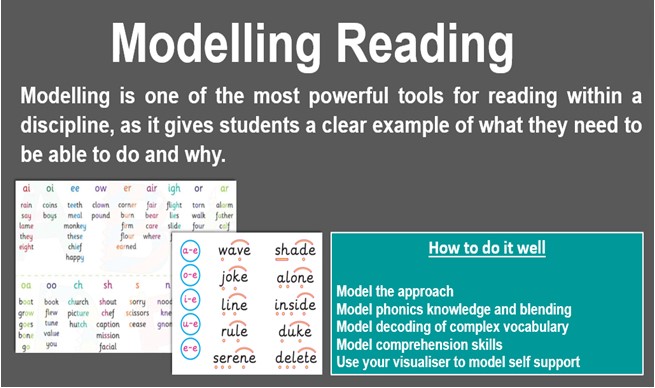
Students identified as being within Stages 1 – 2 will expend
a large cognitive load on recognising the words they are reading. They are
still learning to read; this therefore disadvantages them when they reading to
learn as it leads to cognitive overload. These students receive intensive
intervention additional to the curriculum to ensure they progress rapidly to
fluency and overcome this barrier.
Students identified as being in Stage 3 receive specialist
support within lessons to develop fluency and comprehension strategies.
Students identified as being in Stages 4 – 5 are supported by a curriculum designed to support progressive fluency, with explicit teaching of disciplinary vocabulary and disciplinary approaches to comprehension, and increasingly complex and academic texts sequenced throughout each subject.
Every subject has identified the vocabulary which students need to learn to progress their knowledge in that subject. Vocabulary acquisition is essential to both reading development and securing learning and is a priority across our curriculum.
Although the reading stages are identified to allow for targeted interventions to be put in place, we recognise that students move forwards and backwards within each stage. Comprehension and disciplinary approaches are explicitly taught to all students, with the view that student developing phonic knowledge and accuracy will still, once caught up, need access to this knowledge.
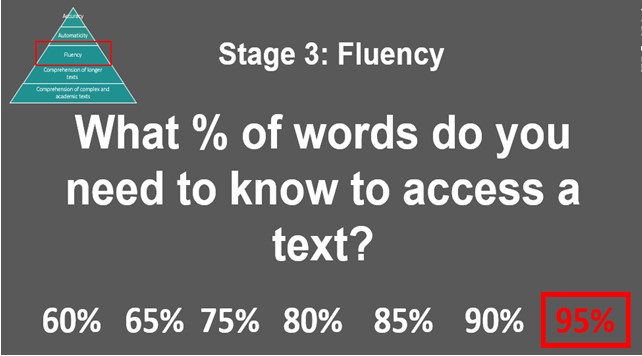
We are committed to ensuring that our students learn not only how to read, but develops a love for reading.
Students in years 7—9 have regular opportunities to visit the ‘LRC’ or library during English lessons where they are supported to borrow books which are appropriate to their reading stage and will help to widen their appreciation of fiction and literature. The LRC is available to all students before and after school and during break and lunch time, and experienced staff are on hand to support with book choices.
The ‘Reading Widely’ rewards scheme runs every year form October to June. This scheme is designed to challenge students to read texts they may not have previously considered, including a range of classical literature and non fiction. Students are rewarded for sustained participation in the scheme over the course of a year. We also run a weekly book club for students to further widen their experience of literature.
All of our year 7 to 9 tutor groups read a novel together once a week, supported by our prefect team, reading three high quality novels over the course of each year. By sharing reading in this way all students whether greater depth or early readers, are able to engage and benefit from the reading.
The texts chosen have been picked to complement our personal
development and PSHCE curriculum, and cover a range of topics relevant to
students of this age group. These text spark debate and discussion and further
students engagement with reading.